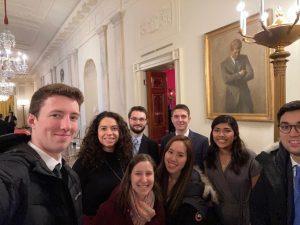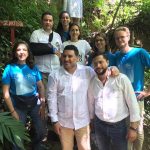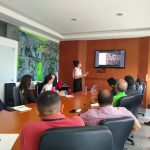We occasionally use this blog to catch up with our former students who are now onto great things. In this installment, we are “Catching up with Ann Bennett.”
Ann is a 2018 graduate of WCU with an interdisciplinary degree in Spanish, Japanese, and economics. For the past two years, she has been working in the D.C. area while pursuing a master’s degree in economics. Her adventures have taken her from corners of campus libraries on three continents to the very heart of economic policy analysis at Washington’s Council of Economic Advisers. Here is a bit of her story.
Q1: Welcome back, Ann! So, you took an interesting route as an undergrad with us. Tell us about that. How did it set you up for what you’re doing now?
I transferred to Western from Brevard College in my sophomore year. I was searching for more opportunities, and I found them: both in Cullowhee and in my studies abroad. I initially wanted to focus on international relations, business, and language studies. Under the business curriculum, I took microeconomics with Dr. Ullmer, and in his class, I found out about CSFE BB&T scholarships to pursue workshops in different universities. These scholarships allowed me to travel to several states including Florida, South Carolina, and Washington D.C. in pursuit of extracurricular education relating to economics. Meanwhile, I expanded my language studies to include Japanese in addition to Spanish.
At that time, WCU students were allotted three semesters of study abroad. Through the UNC consortium program, I studied in Spain during fall 2016 and in 2017 I completed two semesters at Chukyo University in Japan. In Japan, I decided to pursue economics at the graduate level because economics would allow me to funnel my various experiences into a common framework of analysis, capable of answering all my questions about how the world works.
While at WCU I also competed on the track and field team and volunteered with Bridge Church (formerly Campus Church). I graduated from the Honor’s College Magna Cum Laude with a B.A. in Economics and Language Studies (Spanish and Japanese) in May of 2018. However, honestly, I was ready for bigger challenges. Graduate school excited me. In retrospect, I was super fortunate during my time at WCU. I cannot imagine making it this far without all the incredible professors, advisors, and community support I found in my time there.
Q2. So what’s been going on since then?
I was graciously offered the MA Fellowship from the Mercatus Center at George Mason University. The fellowship provides an incredible opportunity to pursue graduate studies while building research skills through working with Mercatus scholars on a variety of topics. In my time at Mercatus, I had the opportunity to work with the Trade and Immigration, Urbanity, and Regdata teams. Through my work, I discovered my passion for urban economics. Mercatus’ urbanity team mainly researches topics involving housing development and regulation. This work prepared me to intern with the Municipality of Guatemala City over summer 2019 working with the planning department, local mayor, and private developers to discuss strategies to promote development in the city.
Q3. You’ve described the specific interests you had when finishing undergrad. Did your first year of graduate work broaden and/or deepen your research interests?
The first year was a heavy dose of reality. Suddenly, things aren’t a breeze, and you have to work harder than you ever have just to barely make it. This is the wonderful thing about graduate school though; it brings out the best in you and humbles you. In my case, it also showed me how lucky I was to have the fellowship and be at GMU. Graduate school is hypercompetitive because many people have very different backgrounds and strengths and weaknesses. To contrast, within the fellowship, you automatically receive a community of students and advisors to support you and guide you through. Many other graduate programs have an “every man for himself” mentality, but GMU is the complete opposite. GMU and especially Mercatus provide a uniquely collaborative environment. I feel very fortunate that my connections at WCU led me to study at GMU. Additionally, as everyone will tell you, the first year is the most difficult, so it’s really important to hunker down and do your best to make it through.
In the process, I gradually realized that my interests in international issues have a lot in common with pressing issues in urban economics. I am from the Chicagoland area, and I have always been fascinated by the problems that confront cities, so working on the development of cities and housing and zoning really piqued my interest. Through contacts made at a FEE event and Mercatus, I was able to secure an internship in the planning department of the Municipality of Guatemala City for the summer of 2019: truly a transformative experience. Working with local governments shows you the constraints faced by policy-makers on the ground.
- Attending summit on clean water initiatives with the former president and minister of the environment.
- Presenting to Guatemala City Land Registry Bureau about policies which promote affordable housing (Spanish)
Q4. You’ve been able to catapult that even further. Tell us about your internship at the Council of Economic Advisers, and what do you see coming next for you?
I really enjoyed my time at the Council. My intern class was full of incredible, talented students from all over the country who inspired me to be the best version of myself. Although I did my tenure as a Master’s student, I highly recommend the program for undergraduate students as well. They pair you with a junior economist to do research, which I really appreciated because it builds accountability and you know who to ask if you have questions or doubts about anything. It is also an incredible opportunity to get up close and personal with understanding the Executive branch which works a bit differently from Capitol Hill. Finally, there’s the wow-factor. I am very thankful for every morning I was able to work so close to the White House, pass important people on the way to coffee, and be mentored by and collaborate with leading economists from across the country.

CEA East Wing tour
This summer I will participate in the American Economic Association Summer program which gives students an opportunity to bolster their qualitative and quantitative skills in Economics. I am very excited to take part in this program which provides a taste of PhD life while building your network with top economics/policy students and faculty from around the country. From July, I will be joining the Young Voices Contributors program which provides training and mentorship opportunities to young writers. In the fall, I wish to work as a research analyst in housing and urban development policy, and start applications for PhD programs in Economics.


